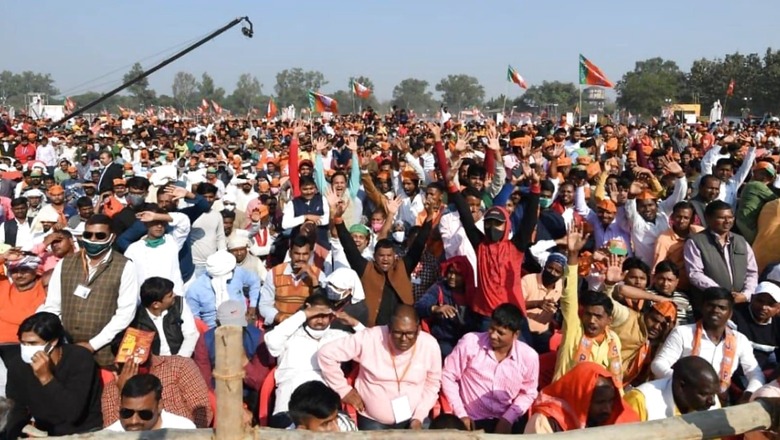
views
After being indecisive for almost a month, the Election Commission of India finally banned all road shows and large public meetings in West Bengal earlier this year, when the second wave of Covid-19 hit India. The five upcoming state elections must also have such restrictions right from the beginning in the wake of the Omicron variant spreading quickly.
Sample this: Between April 9 and 22, the time period from the EC issuing a “strict warning” about banning rallies if Covid-19 norms were not followed and when it finally did for the last two phases of the West Bengal elections, active cases in the state increase three-fold to 69,000, test positivity rate was more than doubled from 10 per cent to over 22 per cent, and daily cases rose three times from close to 3,600 to 12,000.
The EC finally said it had “noted with anguish that many political parties/candidates are not adhering to prescribed safety norms during public gatherings” to bring in the full ban. Three candidates had died of Covid during the West Bengal polls.
These hard facts are before the EC as it is all set to announce the election schedule for five poll-bound states early next month, including Uttar Pradesh that is witnessing massive poll rallies and election yatras by the BJP as well as the Samajwadi Party. All these rallies are attracting massive crowds.
By all accounts, the polls are not being postponed and will happen as per schedule in February-March. This is also the time when Omicron cases are expected to peak in India.
Passing the buck game
First, let’s explain what has happened so far even as the authorities pass the buck on this issue. Many states have clamped night curfews, with Delhi bringing in a “soft lockdown” on Tuesday and poll-bound Punjab banning the entry of those not vaccinated in public spaces.
On December 21, the health ministry issued guidelines to all states in the wake of Omicron, asking for “strict regulation of large gatherings”. When asked about ongoing rallies and election gatherings in Uttar Pradesh, health secretary Rajesh Bhushan on December 24 pointed to the same guidelines.
Clearly, no poll-bound state, such as UP, seems to be following these guidelines given top BJP leaders are in full campaign mode and Akhilesh Yadav is continuing with his election yatra.
While the Centre is putting the onus on states, it has said there were no guidelines from the EC on regulating poll campaigning. The EC said its role only begins when the model code of conduct kicks in, which will be from the day it announces the election schedule.
So far, the EC has met health ministry officials on the Omicron situation and has been told that second-dose vaccination coverage in poll-bound Uttar Pradesh is well below the national average of 62 per cent.
ALSO READ | Let People Deal with Curfews, Politicians Must Enjoy Feel-good Gatherings, Vanity Shows
Ball in EC court
So will the EC go down the usual path of first issuing guidelines for social distancing norms to be followed during rallies and gatherings, when it announces election dates for the five states? The experience of West Bengal shows this approach had no impact then, even after a strict warning was issued and campaigning was curtailed in the evening hours.
Finally, the EC had to ban all road shows and public meetings of over 500 people in West Bengal for the last two phases of elections.
It would be prudent for the EC to bring in such restrictions from the onset in the upcoming elections so as to not expose people to Omicron, even as Covid cases rise across India. People cannot be expected to adhere to night curfew, and then stopped from going to cinema halls, gyms and spas, while political parties are given complete freedom to mingle in large gatherings during the day.
Read all the Latest Opinions here


















Comments
0 comment